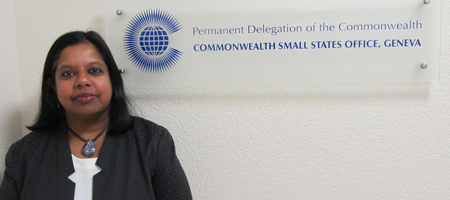Interview with Anuja De Silva, Head of the Commonwealth Small States Office in Geneva | February 2013
February 2013
The Commonwealth is a voluntary association of 54 independent states that aims to promote democracy, good government, human rights and economic development. The Commonwealth is present in Geneva through its Permanent Delegation to the United Nations. In 2011, the Commonwealth opened a new office in Geneva, offering working spaces and services to some of its small Member States. Anuja De Silva, from the Permanent delegation of the Commonwealth in Geneva, tells us more about it.
In addition to its Permanent Delegation in Geneva, the Commonwealth opened a Small States Office in 2011. Why?
The Commonwealth Small States Office is a flagship facility for implementing Commonwealth work in support of those of our member states classified as 'small states and developing states'. The Office serves as a physical base for their participation in the global discourse and decision-making through the many international organisations in Geneva, as well as for diplomatic engagement in the region. The location in the office of resident Commonwealth experts in the fields of trade and human rights will provide such small states and developing states with the specialist technical resources necessary for effective multilateral engagement.
How does this Small States Office work?
The Commonwealth provides subsidised office space to small and developing states, this enables them to have a physical presence which they would not otherwise be able to afford. It also serves as a fully supported temporary base for visiting delegations from Commonwealth member states visiting Geneva for high level meetings and other engagements.
We are flexible in how we provide support to small states, assisting them with those areas of work they themselves identify as priorities. Broadly speaking much of our engagement revolves around trade and human rights since they are priority areas for delegations from our member states visiting or based in Geneva.
Does it have certain priorities?
The Commonwealth Small States Office in Geneva makes a crucial contribution towards our work on the development of small states. The priorities of the office are those agreed by Commonwealth Heads of Government at their biennial meetings. The Commonwealth collectively works towards democracy, development, and respect for diversity with a focus on the rule of law, separation of powers, economic and social resilience and inclusion, and the advancement of human rights. Within these broad areas the Commonwealth has a comparative advantage and special interest in the needs of small and vulnerable states. Our focus on inclusion means that we place special emphasis on working towards ensuring that young people and the marginalised are integrated and able to participate in the social, political and economic life – locally, nationally, and internationally - and that they are able to contribute to decision-making processes.
What are the States hosted in the Small States Office at the moment? Do you plan to host new countries in the near future?
We have Maldives, Seychelles, Sierra Leone and Solomon Islands already in residence, and The Bahamas should be joining shortly. The Gambia and Vanuatu are also expected, and there have been expressions of interest from Belize, Malawi, Papua New Guinea and Tonga. We also have two regional organizations that serve small states, the Organisation of Eastern Caribbean States which service small states in the Eastern Caribbean (not all of them members of the Commonwealth), and the Pacific Islands Forum Secretariat which serves small states in the Pacific region, some of which are also not members of the Commonwealth.
How many member States of the Commonwealth do not have a Permanent mission in Geneva?
Of the 54 member states of the Commonwealth only 32 member states are currently represented or based in Geneva. Some member states are accredited to the UN and WTO but their missions are based in either Brussels, London or New York.
The Commonwealth opened a similar office in New York in 1983. Are there differences between the New York and Geneva Offices?
The Commonwealth office in New York has, as you say, been successfully operating for nearly thirty years. The provision of in-house technical experts was a new development when the Geneva office was set up. This makes a very substantial difference to the effectiveness with which member states based in the office are able to participate, and raises the level of their engagement with the international bodies that combine in the multilateral hub in Geneva.
Your Secretariat is in London. Why is it important for the Commonwealth to be represented in Geneva?
It is vital for the Commonwealth to be represented in Geneva; much of the multilateral engagement in fields such as health, trade, human rights, climate change, that are priority areas for our member states, both individually and collectively, is conducted in Geneva. The work of UN institutions and other international organisations based in Geneva, notably that of WHO, UNCTAD, UNAIDS, WTO, ILO, WMO, contributes to our own Commonwealth goals of democracy, development, and respect for diversity – and our special focus on inclusion and building resilience for the small, the vulnerable, the remote, and the marginalised.
Our Commonwealth presence in Geneva, since the inauguration of the Commonwealth Small States Office with its resident technical experts, enables small states and developing states to participate in the decision making of these key areas.
What are your current priorities in Geneva?
The key priority for the Commonwealth Small States Office in Geneva is to enable more small states to take up tenancies, and to work alongside them in developing fruitful partnerships and engagement with multilateral organisations based in Geneva in order to bring tangible benefits and enduring improvements to the lives and future prospects for the citizens of all the Commonwealth member states with whom we work.
